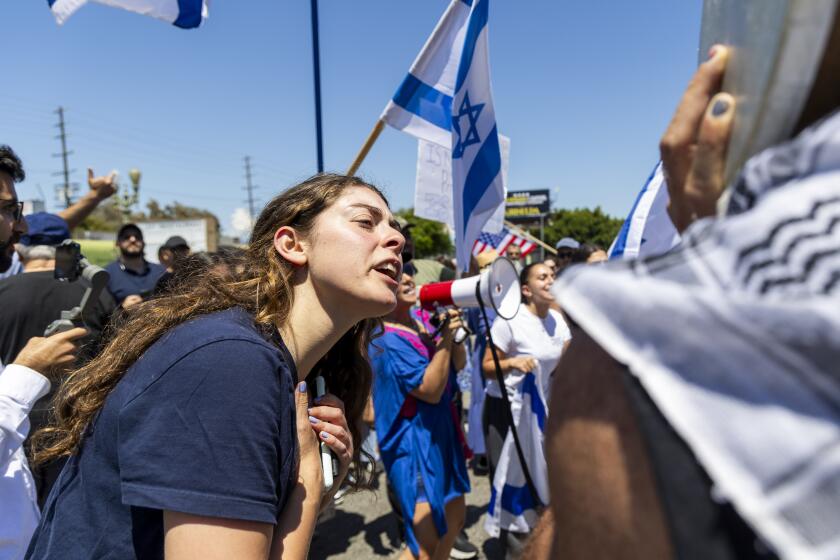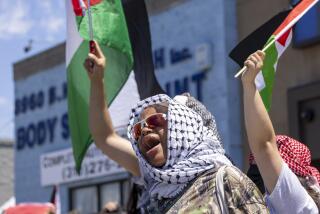LAPD, feds look for synagogue protesters as city mulls over mask restrictions, added security
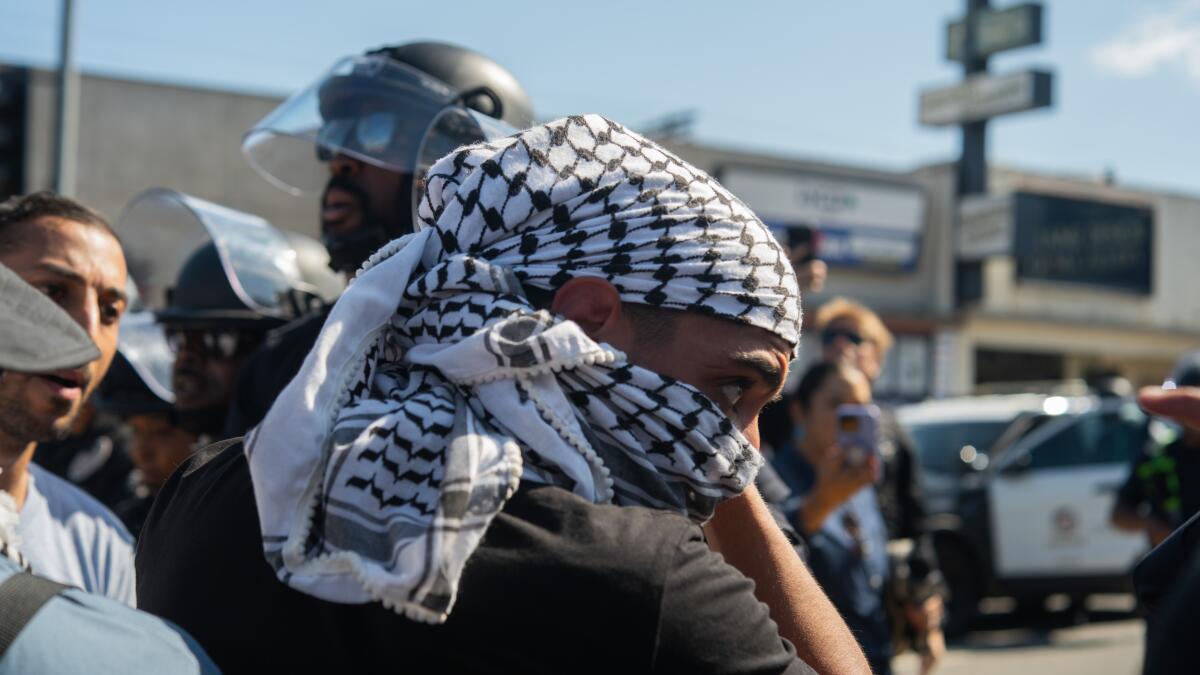
- Share via
A violent protest Sunday at a synagogue prompted Mayor Karen Bass to say Los Angeles should consider rules governing demonstrations and the wearing of masks by those protesting.
Bass did not offer a specific proposal but said the city needed to look at the issue — including “the idea of people wearing masks at protests” and permits for demonstrations. A number of pro-Palestinian protesters had their faces covered Sunday.
During the Los Angeles City Council meeting on Tuesday, Councilmember Katy Yaroslavsky introduced a motion to identify additional resources for security services for places of worship as the city waits for $40 million in promised state funding for nonprofit security grants. Yaroslavsky did not make comments on the motion, which will be brought back for discussion at a later meeting.
At a news conference Monday, Yaroslavsky said Los Angeles is a city of diversity and mutual respect that values Americans’ right to protest, “but we will not tolerate violence, intimidation or any act that seeks to divide us.”
Hours after the clashes, the mayor ordered the Los Angeles Police Department to increase patrols in the heavily Jewish Pico-Robertson area where the protest occurred and at religious venues.
Masks have been a part of many pro-Palestinian protests over the war in Gaza, as well as some in support of Israel, including on college campuses, and their use has spurred debate in some circles.
Law enforcement sources said more than 150 people converged on the temple, and it took time for the Los Angeles Police Department to get enough personnel to the scene.
When a mob attacked a pro-Palestinian camp at UCLA in May, it was difficult to identify suspects because many wore masks that hid their identities. Police said they would use technology that captures facial images and outlines and compares them with other photos on the internet and social media to put names to faces.
During a news conference outside Los Angeles City Hall on Tuesday, members of several organizations, including the Palestinian Youth Movement, the Party for Socialism and Liberation, and Southern California Students for Justice in Palestine, said unarmed individuals were “brutalized” by police officers and pro-Israel demonstrators during Sunday’s protest.
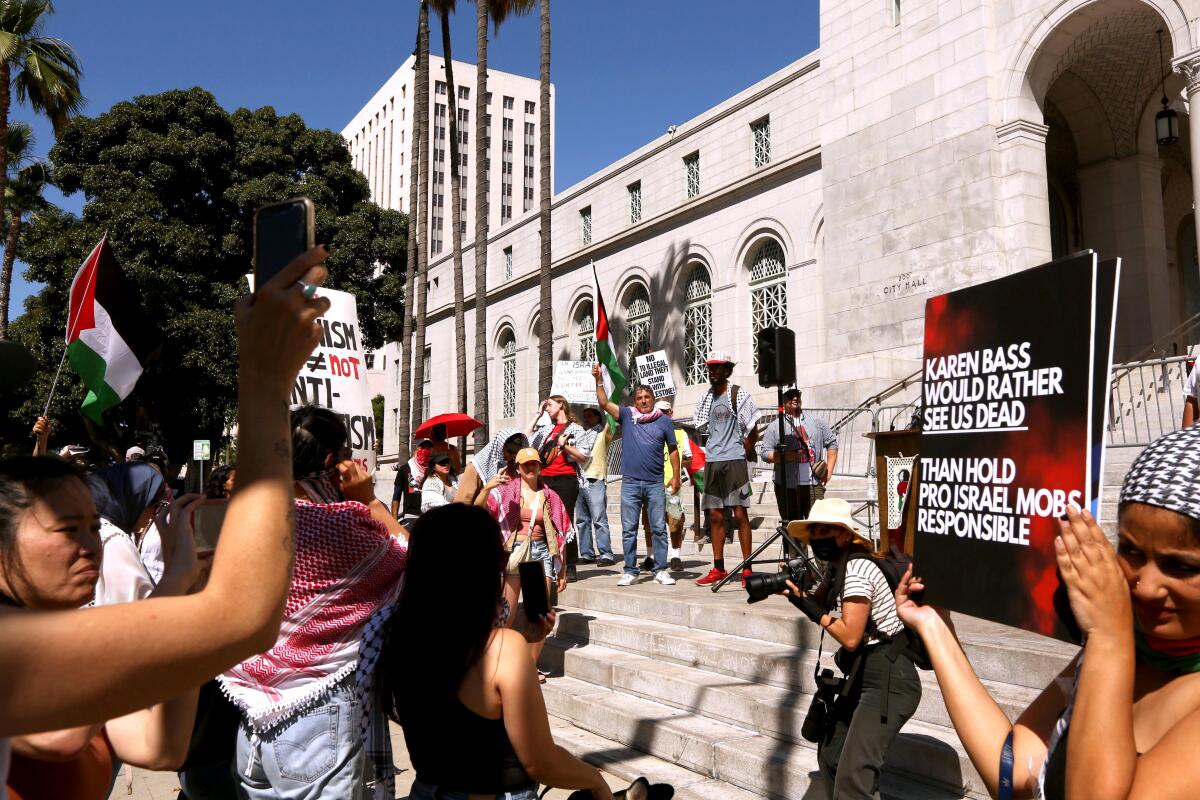
“The Zionist attackers followed us and doxxed us with the intent to cause physical harm, targeting those wearing hijabs, pulling them off and throwing eggs at our heads,” said a member of the Students for Justice in Palestine who declined to provide her name to The Times. She added that the counterprotesters threatened to use “law enforcement connections to find out our identities and our addresses.”
Interim LAPD Chief Dominic Choi told the Police Commission on Tuesday that investigators were working with federal agencies to identify those who committed crimes during Sunday’s melee outside the synagogue.
A pro-Israel demonstrator who was carrying a sharp pole was arrested, and two incidents of battery were reported during the conflict. Two officers and others were affected by a chemical irritant that was used by a pro-Palestinian protester whom the department is seeking to identify as part of a criminal investigation, Choi said.
“We are going to pursue criminal action on those behaving criminally at these protests,” he said.
Commission President Erroll Southers said the panel has a duty to uphold the U.S. Constitution and echoed similar sentiments made by Bass a day earlier.
“The 1st Amendment enforces the right to openly protest, but it also affords the right to openly worship freely,” he said.
At one point during Southers’ comments, a pro-Palestinian protester stood up and yelled, “You’re telling lies on behalf of the pro-Israeli protesters.” Southers ordered the man removed from the meeting.
It is unclear what action the government could take to restrict mask use at protests.
During the 2020 George Floyd protests, some health officials urged demonstrators to wear masks to protect against COVID-19. Although coronavirus cases have fallen dramatically since then, masks can still offer protection, especially to those who have underlying health problems.
Earlier this month, New York Gov. Kathy Hochul said she was considering a mask ban on the New York subway, saying she was concerned about people with face masks committing antisemitic acts. New York Mayor Eric Adams supported the idea, telling reporters that “cowards cover their faces.”
Some civil liberties advocates opposed the idea.
Jay Stanley, a senior policy analyst with the American Civil Liberties Union, wrote in a May commentary that targeting people who wear face coverings during protests is “a big problem.”
“At a time when both public and private actors are increasingly turning to invasive surveillance technologies to identify protesters, mask-wearing is an important way for us to safeguard our right to speak out on issues of public concern,” he wrote. “While the ACLU has raised concerns about how anti-mask laws have been wielded for decades, we are especially worried about the risk they pose to our constitutional freedoms in the digital age.”
A collective research effort has cropped up to name and shame the pro-Israel demonstrators who carried out violence at UCLA. Distrusting police to deliver justice, people are taking it upon themselves.
There have been no formal proposals in Los Angeles, and it’s unclear whether the City Council would support the idea.
But a local Anti-Defamation League official expressed support for a mask restriction. Jeffrey Abrams, the ADL’s Los Angeles regional director, stood alongside Bass at Monday’s news conference and said the city needed to do more to protect the community.
“Just as Mayor Bass said, we need to look at every available legal tool, as the city attorney looks at existing anti-masking laws in the state of California,” Abrams said.
The Sunday protest was condemned by top officials, including Bass, President Biden and Gov. Gavin Newsom.
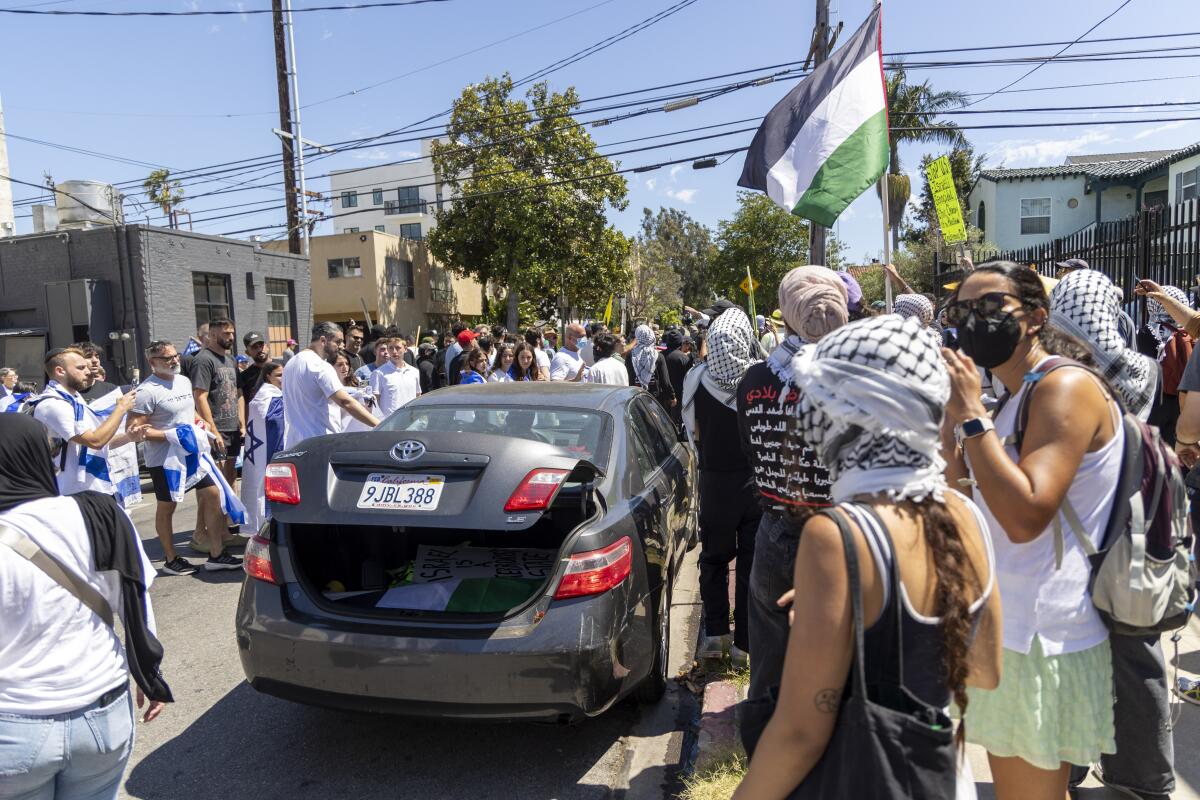
Around noon Sunday, about 100 pro-Palestinian protesters arrived at the Adas Torah synagogue. Choi said the group “attempted to block the entrance of the synagogue,” but a handful of police officers and private security preserved the entrance.
About half an hour later, an additional 100 pro-Palestinian demonstrators and 150 pro-Israel protesters arrived in the area. Roughly an hour after that, Choi said, a mobile field force arrived and attempted to disperse the crowd, which had grown violent.
The speaker at Tuesday afternoon’s news conference who declined to give her name said the media and elected officials “falsely conflated [Sunday’s] action with antisemitism.”
Those at the news conference said the individuals who gathered outside the synagogue over the weekend sought to “disrupt a Zionist real estate company’s illegal auction of stolen Palestinian land.”
The real estate event was advertised in Friday’s issue of the Jewish Journal promising to provide information on “housing projects in all the best Anglo neighborhoods in Israel.” “Anglo” is a translation from Hebrew meaning “English-speaking.” The ad does not specify where in Israel the real estate is.
Similar real estate events that aim to help buyers answer questions about purchasing property in Israel have been held at synagogues across the country, at times sparking demonstrations. An event that was expected to be held in Brooklyn in March was canceled, purportedly because of a planned protest.
My Home in Israel and IMP International, the companies listed on the advertisement, could not be reached for comment Tuesday.
An archive of the My Home In Israel real estate website showed home listings priced between $435,000 and $4.1 million in locations including Tel Aviv, Giv’ot Eden, Jerusalem and in the West Bank territories Efrat and Ariel. Much of the international community, including the U.S. and the United Nations, say that settlements in the West Bank are illegal under international law. Israel disputes this claim.
One property in Efrat listed at $1.3 million is comprised of 32 residential villas “enveloped by nature,” according to the website.
“The project offers an array of opulent apartments and private single and two-family villas, each adorned with expansive gardens, private pools, and a dedicated elevator for added exclusivity,” the listing read. The company’s website appeared to have been taken down as of Tuesday.
In response to the advertisements, protest fliers shared on social media by the Southern California chapter of the Palestinian Youth Movement said, “Our Land Is Not For Sale,” condemned “land theft,” and called for people to rally on Sunday.
“In East Jerusalem and the West Bank we continue to witness the expansion of settlements and the forced displacement of Palestinians,” said a member of Southern California Students for Justice in Palestine who declined to provide her name to The Times. “We know that the establishment of the Zionist entity was rooted in genocide, violence and displacement. Zionists reside on the mass graves of Palestinians.”
Hussam Ayloush, the executive director of the Council on American-Islamic Relations office in Los Angeles, said Monday that the protest “was in response to the blatant violations of both international law and human rights from agencies that seek to make a profit selling brutally stolen Palestinian land.”
“Elected officials and the mainstream media have politicized this incident as religious discrimination as opposed to a human rights issue,” Ayloush added.
More to Read
Sign up for Essential California
The most important California stories and recommendations in your inbox every morning.
You may occasionally receive promotional content from the Los Angeles Times.
